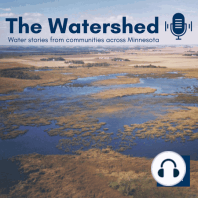18 min listen
27 | The Waters We Come From (Dakota County, MN)
FromThe Watershed
ratings:
Length:
24 minutes
Released:
Nov 4, 2022
Format:
Podcast episode
Description
The We Are Water MN exhibit is on the road for its 2022 tour. Throughout the year, We Are Water MN will be visiting five different communities in the state of Minnesota: Winona, Lake City, Alexandria, Otter Tail County, and Dakota County. On The Watershed podcast, we’ll be sharing series of episodes that reflect on the water stories of people who live in each of these places.
We Are Water MN is currently visiting Dakota County. You can view the exhibit at the Pleasant Hill Library and outdoors at the Lebanon Hills Visitor Center October 13 through December 5. Learn more: https://www.co.dakota.mn.us/Environment/WaterResources/Pages/we-are-water.aspx
On our final episode featuring Dakota County, our storytellers share about special places that formed their paths and commitments to water stewardship.
We are Water MN is led by the Minnesota Humanities Center in partnership with the Minnesota Pollution Control Agency; the Minnesota Historical Society; the Minnesota Departments of Agriculture, Health, and Natural Resources; and University of Minnesota Extension, with support from the Clean Water, Land & Legacy Amendment and the National Endowment for the Humanities.
To learn more about We Are Water MN, visit us at our website. Follow us on Facebook and Twitter.
We Are Water MN is currently visiting Dakota County. You can view the exhibit at the Pleasant Hill Library and outdoors at the Lebanon Hills Visitor Center October 13 through December 5. Learn more: https://www.co.dakota.mn.us/Environment/WaterResources/Pages/we-are-water.aspx
On our final episode featuring Dakota County, our storytellers share about special places that formed their paths and commitments to water stewardship.
We are Water MN is led by the Minnesota Humanities Center in partnership with the Minnesota Pollution Control Agency; the Minnesota Historical Society; the Minnesota Departments of Agriculture, Health, and Natural Resources; and University of Minnesota Extension, with support from the Clean Water, Land & Legacy Amendment and the National Endowment for the Humanities.
To learn more about We Are Water MN, visit us at our website. Follow us on Facebook and Twitter.
Released:
Nov 4, 2022
Format:
Podcast episode
Titles in the series (59)
05 | Honoring the Water by The Watershed
